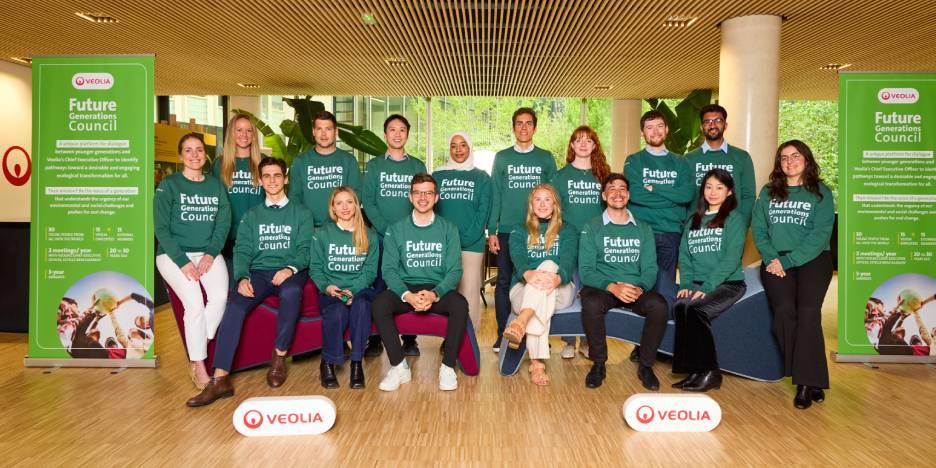Sixteen young talents under 30 from five continents, one common mission: accelerating the path to a desirable and engaging ecological transformation for all. By creating its Future Generations Council on April 23, 2025, Veolia is betting on boldness and innovation by giving new generations a key role in its environmental and social strategy.
Veolia announces the launch of the Future Generations Council, a body chaired by an external figure, Niels de Fraguier, bringing together 15 young Group employees from around the world. They will be joined in October by 15 young external members, strengthening dialogue between the company and civil society.
This Council provides a unique platform for dialogue between Estelle Brachlianoff, Veolia's Chief Executive Officer, and young leaders. Its mission is both to assess the expectations of new generations and transform current and future challenges into opportunities to advance ecological transformation. Council members will meet twice a year with Executive Management and will be able to propose concrete ideas within this body.
Listening to voices from 5 continents
As Estelle Brachlianoff, Veolia's Chief Executive Officer, emphasizes: 'Future generations are an absolutely crucial stakeholder. So what I expect from them is not just to bring their youth, but to bring their boldness, to dare to innovate and push the boundaries of what may seem obvious but should perhaps be redebated.'
The Future Generations Council Presidency
Niels de Fraguier, 29, is a committed French entrepreneur and author. He notably co-founded the Positive ecosystem bringing together over 200 companies and co-wrote 'The Regenerative Enterprise'. For him, 'we are today at the intersection of converging crises that offer us the unique opportunity to reinvent how we create value.'

He added after the first Future Generations Council meeting with Estelle Brachlianoff on April 23: 'Today, we agreed on a main theme to examine and a key question: how to create the industry of the future? How to examine risks, opportunities, but also foster a culture of failure and trial to succeed in creating solutions adapted to the future?'
The Future Generations Council marks a new step in the Group's commitment to accelerate ecological transformation by giving voice to young generations. It reinforces the Group's other stakeholder dialogue bodies, such as Critical Friends or +1, for ecology in action.
Faces of change: portraits of Council members
The diversity of profiles and experiences of Council members illustrates Veolia's desire to build an inclusive and meaningful ecological transformation by giving new generations the means to concretely influence the group's strategy.

Asia-Pacific representatives
Xingpei Yao, 30, External Relations Manager in China, brings expertise on Asian regulatory issues: 'My work offers me an ideal position to integrate youth priorities into strategies.'
Jonathan Jo, 28, Process Engineer in Australia, sees this initiative as 'Veolia's commitment to collaborative dialogue between emerging and established leaders.'
Voices from Africa and the Middle East
Fatema Naser, 29, engineer in the UAE, states: 'Our generation can no longer be satisfied with gradual change.'
Clément Bonne, 28, based in France for the Africa Middle East zone, emphasizes the importance of 'representing countries, among those where the group operates, that have the youngest population.'
Europe in motion
Federico Brambilla, 25, energy efficiency specialist in Germany, advocates 'leveraging synergies between young generations' ideas and previous generations' experience.'
Mairéad O'Driscoll, 27, marketing manager in Ireland, wants 'more concrete integration of ecological transformation in business strategy.'
Katarína Hanusová, 25, technology specialist in Czech Republic, and Jonas Budde, 31, executive assistant in Germany, complete the European trio.
France and Northern Europe
Laure Thirot, Adèle Peugeot, Lucy Stephenson and Alex Gil Marty bring their varied expertise in energy, business development and innovation.
The Americas
Emily Gladden and Kanha Matai in the United States, along with João Donadio in Brazil, represent the American continent, each bringing their unique vision of ecological transformation.
A structured methodology for concrete results
The Council will work on two issues per mandate, chosen jointly with Executive Management. Work will be structured in three phases: problem definition to analyze issues, foresight to identify risks and opportunities, and implementation to develop concrete solutions.


